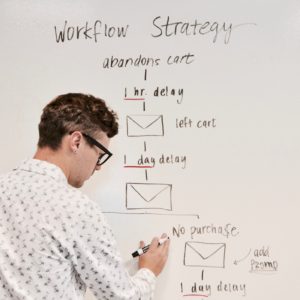Learning must come before deciding
Synopsis — 60-second read: For experienced professionals, unlearning any conflicting or misapplied information comes before true learning can take place. This is usually harder than learning anything new as it requires suspending (not acting on) any reactions or strong impulses that initially arise. This matters because, unless you can take a breath and stay interested for more than just a few breaths, you’ll likely filter out all that is new and innovative because it is different from what you already know. In times of change, such innovations — sometimes radical departures from familiar traditions — are a necessary part of the future. Expect more such innovations, so be prepared to understand with “fresh eyes” programs or ideas that seem useful.
Suspend disbelief, but bring any skepticism, concerns or points you find confusing with you to open discussion. Seek solutions. Let preconceived ideas wait outside.
Another way to look at this: managing change in this professional realm is a personality test. Some people have “Teflon” personalities. Nothing sticks. They are impervious to new, outside information when it fundamentally differs from what they already know, or if it conflicts with current paradigms. They want to stick to their view, which often reflect their own cultural traditions, even (especially) if there are new facts that initially conflict with certain long-held beliefs, seemingly sacred beliefs, or at least ideas or methods that become inculcated as “how things are” (and ought to be).
Bottom line: have the intent to listen and learn. Do not listen just for facts that are consistent with what you earlier assumed to be true, in support of your current beliefs. Nor is it helpful to learn just the new facts that help you gather further evidence consistent with current thinking. Listening with the intent to learn can be challenging. At first, incoming new information can sound “alarm bells” in your head that may be telling you to either push back (argue, in an effort to invalidate the new and preserve what you know is “right”), or to take evasive action — change course, or change the subject, STAT! This is part of the brain’s survival mechanism, automatic and extremely fast-acting.
If anything in this article has rung that bell for you, you’ll want to stop reading and do something else — anything else — even before getting to the period at the end of the next sentence. Breathe. Take a moment to pause, reflect, and take time to carefully review and synthetize new understanding before making decisions. Famed investor Ray Dalio wrote “Synthesis is the process of converting a lot of data into an accurate picture. The quality of your synthesis will determine the quality of your decision making.”
Everyone is entitled to their opinion, of course, but facts are usually verifiable, more objective, harder to disprove. Have you noticed that sometimes facts are presented that are no more than wishful thinking, which doesn’t make them right or wrong; it makes them either a theory, hypothesis, opinion or ethos. Facts are different. What’s closer to a fact? Something that can be traced to a proven source, or supported and rationalized as empirically true (watch out for these), whether or not proven. More
But once let in, some personalities consider the source and immediately seek to discredit those new facts (because of the source, not the facts, usually) as untrustworthy. Innovation happens everywhere, as does learning how to innovate, and new facts can take a long time to gain widespread acceptance — indeed, some can take decades to fully arrive and become part of a culture as “new normal” just as certain new materials (like recycled plastic), or electric vehicle, started as outsiders but became more commonplace.
It can be terribly frustrating to see one set of facts while others are so narrow-minded, impervious to innovation, seemingly incapable of looking at something through “fresh eyes.” Time and opportunities can disappear, taking new, valuable and game-changing facts into oblivion. Being wedded to one’s opinions is normal (we all have egos and want to think we know certain things), but being willing to reconsider fundamentals in the face of new evidence requires a strong desire to learn and grow and improve the status quo.
In other words, none of us can convince a mule. It is important to not be the mule.
Because of this, going back to finance, it is usually best to put aside any preconceived notions of how (for example) CAP funding’s “demand guarantees” should work. We often get asked why insurance bonding isn’t enough, and the reason is simply that an insurance products does not constitute a financial instrument. Those who have experience with such bonding are particularly dumfounded by why most banks and senior lenders can use such insurance, but we cannot. We use standard tools with no senior lien and other innovative twists in order to solve real customer problems — mainly, the frustration developers often encounter with reaching financial closing at decent terms for well-deserving projects.
Why this focus on learning? Because CAP funding’s unique structure is going to be new to almost everyone. If you let yourself get lost in reactions to the new information described herein then you really won’t be able to decide what you want to do with it, because the background noise of your subconscious signaling you that something is wrong — either too good to be true, too complex, or some other felt sense of discomfort — will render your decision nothing more than prejudice. We support making wise decisions, … which takes synthesis of new with old, so first let’s discuss what’s new to put that alongside what is familiar.
In conclusion, to decide if this funding opportunity is for you will require most professionals to temporarily step outside their comfort zone to let in the new information. This will eventually make sense, and history shows it will be worth it, because there are great benefits in store — if you see it as it is.
The payoff of taking a few minutes to discover this is of far greater value than feeling comfortable all the time. More on how learning must come before deciding, and the importance of suspending judgement in situations like this, especially if you happen to disagree with the new information at first, authored by famed investor Ray Dalio’s LinkedIn post
Resources:
- Quick Guide to financial guarantees — how to test your way in and get results.
- How to communicate with bankers (article)
- How to prepared for discussing this with others (3-page PDF)
- Decision-making and facilitation guide to CAP funding guarantees




